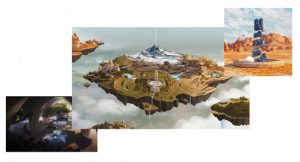Funeral DX Will it take root in Japan?
The effects of the declining birthrate and aging population are appearing everywhere in society of Japan. The influence extends to ceremonial occasions. Ceremonial occasions are events that strongly reflect the history, traditions, and culture of the country. In recent years, zero burials (funerals in which the bereaved family does not collect the remains after cremation), natural burials (a burial method in which the ashes are returned to nature instead of the grave, so-called scattering), and tree burials (graves with trees as symbols instead of gravestones) have been selected. The number of people who do this is increasing, especially in urban areas. Funeral DX, which is one step further, is about to be launched.

メタバース上の墓(graves on the metaverse)
Smart Senior is promoting Age Tech from the perspective of a new social model, and is working on Funeral DX as part of that.
The company is developing funeral DX in cooperation with US companies. Specifically, they support the creation of a community for bereaved families, such as building a digital grave (website) and a net cemetery for the deceased in virtual space. Thet are holding a permanent memorial service for the net cemetery where 700,000 people around the world sleep.
Smart Senior has been promoting funeral DX in Japan for several years, but there are various differences between Japan and the United States.
“At first, we developed the Japanese market through B2C, but it did not work. There are many elderly people who are not good at IT. In addition, there is a strong stereotype about actual graves, so they tend to be reluctant to digital. We have thought B2B2C system is needed to promote the funeral DX” (Mr. Fujisawa).
Smart Senior is appealing in cooperation with funeral homes and stone shops.
For example, a stone store offers digital graves to customers who want to close their graves. It is a service that digitizes all the information of actual graves that are closed and stores them in registered net cemeteries. With this, you can visit a grave just by accessing it with QR code, so even if you are not good at IT, you can use it.
Mr. Fujisawa said, “We expect funeral DX to develop as a hybrid between real and online in Japan”.

葬送の一式化イメージ(One set-izing of attendance at a funeral )
Eco24.com, under the brand name Funeral 24.com, handles funeral arrangements, corpse transportation, and funerals for welfare recipients.
Currently, we are focusing on “Natural Funeral DX” and developing a set of natural funerals and digital funerals. They provide one-stop support for funerals, burials, scattering of ashes, and memorial services.
The company has received positive feedback, saying, “That will be the case in the future,” but they feels there are high hurdles to overcome.
President Junichi Kondo said, “Japanese people put their thoughts into the ashes. That is the hurdle for digital graves”.
It is said that the tendency to be particular about the remains is unique to Japanese people, and is not seen in Westerners. Occasionally, we hear about grave robbers stealing ashes, to sum up, Japanese people are so particular about their ashes that they dare to steal them.
Today, funerals have changed. In the background lies the reality of an aging society with a declining birthrate.
One is that for the elderly, commuting has become a burden and they are no longer able to hold gatherings like they used to. That’s why people don’t do funerals.
“The scale of funerals has shrunk significantly from 10 years ago to now. The number of company funerals has also dropped sharply.
The economic problem is also not small. Protracted deflation has made people more thrifty and reluctant to spend money on funerals and other ceremonial occasions. Due to economic reasons, maintenance of the graves has become difficult, and the number of cases where the graves are closed is increasing.
“From this point of view, digital graves are suitable for modern people. First of all, we want to appeal to people in urban areas who are highly sensitive,” says Kondo.
